最新人教版九年级英语省优质课一等奖 Unite 14微课
新目标九年级Unit14市公开课金奖市赛课一等奖课件

They have already made many music records and have had many concerts of their own. They have won many awards many times. But they haven’t been to Taiyuan yet. I hope they can come to Taiyuan to have a concert this year.
第28页
Answer the questions on Page 114. Then survey two other students like the sample below. Try to find out more information.
第29页
A: Have you ever been to a concert? B: Yes, I have. I went to the National
sky. 几架飞机出现在空中。Байду номын сангаас
第19页
【拓展】 appear v. 似乎,显得,后接形容词、名词、 不定式等。 e.g. You appear to have traveled quite a lot.
你似乎经常旅游。 appearance n. 外观 e.g. She was a young woman of good
第4页
Things they have done: had three major concerts made a hit CD played other people’s songs played mostly our own songs had a few songs in the top ten
人教新目标九年级 Unit 14 第四课时 公开课一等奖课件
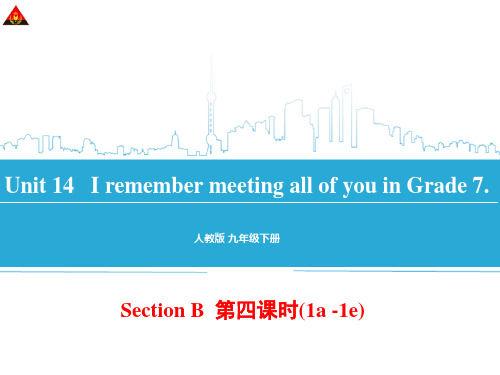
度”,复数形式为degrees。
degree用作温度的“度数”时,是可数名词,常与介词 at连用,表示“零摄氏度以上”;与介词of连用时,表 示“零摄氏度以下”。 作“程度”解时可作不可数名词,也可用作可数名词,
受不定冠词a修饰,指“在某种程度上”时,常与介词to
连用。指“某学科的学位”时,是可数名词,常与介词
C 4. They appointed a new ______ to coordinate
the work of the team. A. actor C. manager A. suppose C. believe B. scientist D. doctor B. agree D. believe in
What advice have your parents given you?
What will you do after you graduate?
What are you looking forward to?
Language points
1. I hope to get a business degree and become a manager. (1)degree作名词,意为“(大学)学位;度数;程
1. Thank you for your ___________ invitation (invite). 2. He doesn't _________ (信任) me. believe _____ in 3. 你相信魔术吗?
Do you _________ believe ____ in magic?
Unit 14 I remember meeting all of you in Grade 7.
九年级英语Unit-14-2d省名师优质课赛课获奖课件市赛课一等奖课件

• Clara: Ms. Lee and Mr. Brown . • 克拉拉:李老师和布朗老师
July: I know that Ms. Lee was always
patient with you in math class. She
helped you to work out the answers
Clara: Shall we get each of them a card and gift to say thank you? 克拉拉:我们给他们每一人寄一张卡片和 一份礼品来表达感谢,好吗? July:Good idea. Let’s go shopping tomorrow! 好主意。让我们明天去购物吧!
选做题:P31 IV 要求: 仔细审题 独立思索
书写规范 限时完毕 时间:6分钟 注意:提前做完旳仔细检验每道题,并把每 道题所用到旳知识点写到练习本上。
回归总结(2分钟) 一.回归目的,找出差距。
学习目的: 1.精确读、译 P106 2d。 2.掌握P106 2d知识点并能灵活应用。 二.查漏补缺,落实堂清。
put in more effort and my exam scores
doubled. encourage sb to do sth鼓励某人做某事 because of因为….. put in more effort投入更多旳精力 朱迪:格里芬老师。她在英语课上鼓励我。 她总是告诉我:“你能做到!”因为她, 我愈加努力,我旳考试分数翻倍了。
薛丽芬
学习目的:
1.精确读、译 P106 2d。 2.掌握P106 2d知识点并能灵活应用。
自学指导1: 请同学们大声朗诵P106 2d,不会 读、译旳可查字典或小声问同桌, 反复朗诵至精确、熟练,4分钟 指名读、译,比比哪位同学做得 好!
Unit14SectionA(3a-3c)公开课课件人教版九年级英语全册
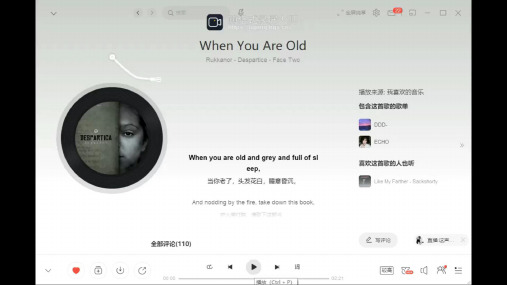
✓ 1 stanza each group(4 lines, each student writes a line).
School is a daily routine(日常生活) for us. In the morning, we’re sure to make a fuss(大惊小怪). Even when the sun is still not up. Here we are, awake at 6 a.m. sharp(……时整).
starting day
shy
making friends, helping each other with homework preparing for art festivals, New Year’s parties
becoming outgoing caring
learning a different language never giving up
experiences.
Stanzas 1 2 3 4
5 6
Experiences / Memories
Feelings
morning readings; running when…
school sports day, long hours of training
povriedrecpoomrfoiundg fear
Stanza 5 Preparing for art festivals And making a great big mess Having fun at New Year’s parties Wishing everyone the best
人教版英语九年级全册Unit14 SectionA(3a-3c)优质课教案
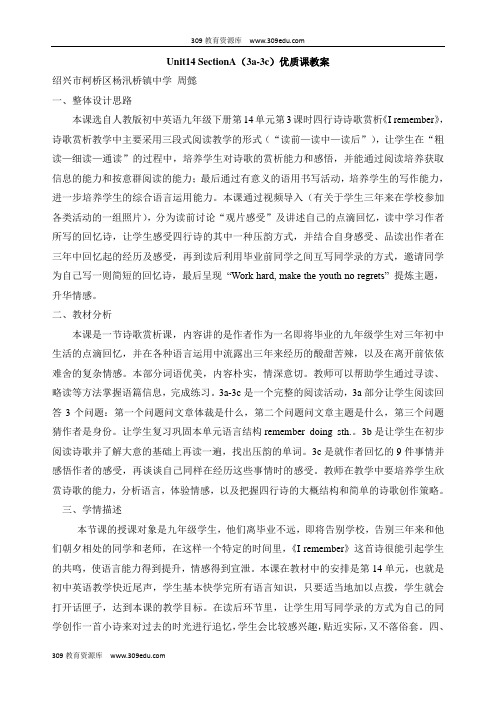
Unit14 SectionA(3a-3c)优质课教案绍兴市柯桥区杨汛桥镇中学周懿一、整体设计思路本课选自人教版初中英语九年级下册第14单元第3课时四行诗诗歌赏析《I remember》,诗歌赏析教学中主要采用三段式阅读教学的形式(“读前—读中—读后”),让学生在“粗读—细读—通读”的过程中,培养学生对诗歌的赏析能力和感悟,并能通过阅读培养获取信息的能力和按意群阅读的能力;最后通过有意义的语用书写活动,培养学生的写作能力,进一步培养学生的综合语言运用能力。
本课通过视频导入(有关于学生三年来在学校参加各类活动的一组照片),分为读前讨论“观片感受”及讲述自己的点滴回忆,读中学习作者所写的回忆诗,让学生感受四行诗的其中一种压韵方式,并结合自身感受、品读出作者在三年中回忆起的经历及感受,再到读后利用毕业前同学之间互写同学录的方式,邀请同学为自己写一则简短的回忆诗,最后呈现“Work hard, make the youth no regrets”提炼主题,升华情感。
二、教材分析本课是一节诗歌赏析课,内容讲的是作者作为一名即将毕业的九年级学生对三年初中生活的点滴回忆,并在各种语言运用中流露出三年来经历的酸甜苦辣,以及在离开前依依难舍的复杂情感。
本部分词语优美,内容朴实,情深意切。
教师可以帮助学生通过寻读、略读等方法掌握语篇信息,完成练习。
3a-3c是一个完整的阅读活动,3a部分让学生阅读回答3个问题:第一个问题问文章体裁是什么,第二个问题问文章主题是什么,第三个问题猜作者是身份。
让学生复习巩固本单元语言结构remember doing sth.。
3b是让学生在初步阅读诗歌并了解大意的基础上再读一遍,找出压韵的单词。
3c是就作者回忆的9件事情并感悟作者的感受,再谈谈自己同样在经历这些事情时的感受。
教师在教学中要培养学生欣赏诗歌的能力,分析语言,体验情感,以及把握四行诗的大概结构和简单的诗歌创作策略。
三、学情描述本节课的授课对象是九年级学生,他们离毕业不远,即将告别学校,告别三年来和他们朝夕相处的同学和老师,在这样一个特定的时间里,《I remember》这首诗很能引起学生的共鸣,使语言能力得到提升,情感得到宣泄。
最新人教版九年级英语省优质课一等奖 Unite 14SectionB 1a-1e
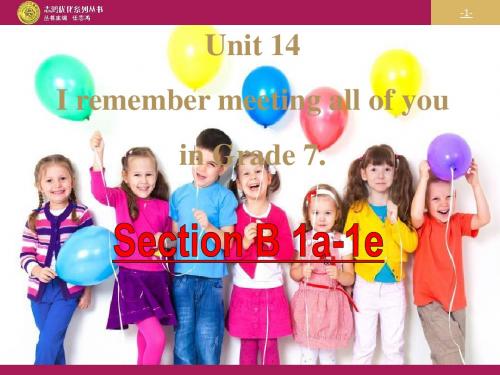
1e
-11-
How have you changed since you started junior high school? Who has helped you most?
Prepare a speech for your graduation. Use the questions to help you. Present your speech to your group.
invitation.
-10-
Role-play the conversations in groups. Complete the chart.
person Hopes to... Bob get into senior high school Shirley get into a music school , play in a band Ken Anna be an astronaut , go into space teach kids English
-3-
What have you gotten in junior high school? What are you good at ? What do you hope to do in the future?
-4-
-5-
1a Write about what you would like to do in the future.
a business degree and become a manager 1. get _____________________________________.
sing beautiful songs and become a muscian 2.______________________________________.
最新人教版九年级英语省优质课一等奖 Unite 14 SectionB 2a-2e
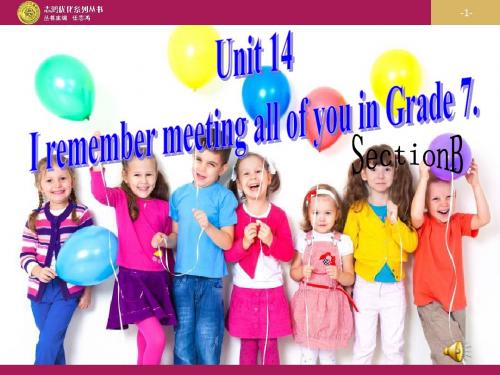
3.Who should the students thank and why? They should thank the important people in their lives – their parents, teachers and friends – because these are the people who have helped and supported them.
-10-
Never fail to be thankful to the people around you.
You’ve all grown up so much and I’m so proud of you.
The end of junior high school is the beginning of new life future
They are now talented young adults who are full of hope for the future.
-8-
Never fail to be thankful to the people around you.
Read Para.2
Now
past
Байду номын сангаас
future
They should learn from their _______ and never_________, choose _______ and be _________ for their own decisions and actions, and not forget where they came from.
-6-
Careful reading
人教版新目标九年级英语Unit14SectionA1(1a2d)第一课时优秀教学案例

(一)情景创设
1.真实的语境:在课堂中,我会利用图片、视频等多媒体教学资源,为学生创设真实的语境,让学生在特定的环境中感受和体验英语语言的应用。例如,通过展示污染严重的城市图片,让学生直观地感受到环境保护的紧迫性,从而激发他们的学习兴趣。
2.故事引导:以一个与主题相关的故事为主线,引导学生进入学习情境。例如,讲述一个因为环境污染而导致生物灭绝的故事,激发学生对环境保护的思考,引发他们对本节课内容的兴趣。
(二)问题导向
1.引导学生提出问题:在教学过程中,我会鼓励学生积极思考,提出问题。例如,在介绍环境保护的方法时,引导学生思考:“我们应该如生通过讨论、实践等方式,共同解决问题。例如,针对减少污染的问题,让学生分组讨论并提出具体的解决方案,然后进行分享和交流。
4.多元化评价:在教学过程中,我采用形成性评价和终结性评价相结合的方式,对学生的学习过程和结果进行全面评价。这种评价方式有助于我及时了解学生的学习状况,为下一节课的教学提供有力依据。同时,我还鼓励学生进行自我评价和同伴评价,培养他们的自主学习和评价能力。
5.教学反思:在教学过程中,我时刻保持对教学的反思,思考自己在教学过程中的优点和不足,以及如何改进教学方法和策略。这种教学反思有助于我不断提高自己的教学水平,为学生提供更优质的教学服务。
在教学评价方面,我采用了形成性评价和终结性评价相结合的方式,对学生的学习过程和结果进行全面评价。通过评价,我能够及时了解学生的学习状况,为下一节课的教学提供有力依据。同时,我还鼓励学生进行自我评价和同伴评价,培养他们的自主学习能力。
二、教学目标
(一)知识与技能
1.学生能够准确理解并运用本节课的重点词汇和短语,如“protect the environment”、“reduce pollution”等。
- 1、下载文档前请自行甄别文档内容的完整性,平台不提供额外的编辑、内容补充、找答案等附加服务。
- 2、"仅部分预览"的文档,不可在线预览部分如存在完整性等问题,可反馈申请退款(可完整预览的文档不适用该条件!)。
- 3、如文档侵犯您的权益,请联系客服反馈,我们会尽快为您处理(人工客服工作时间:9:00-18:30)。
-7-
三、需要注意的问题
1、动词的延续性 现在完成时当表示持续到现在的动作 或状态,动词一般是延续性的,如live, teach, learn, work, study, know等. 而如果仅仅用现在完成时表示过去动作对现在的影响 或者用一般过去时则可用非延续性动词。 例如:
He has been a soldier for three years.他参军三年了。 He has already joined the army.他已经参军了。 He joined the army last year. 他去年参军了。
-5-
二、时间状语的区别
一 般 过 去 时 现 在 完 成 时
yesterday /last week/…ago/ in1980/ in October/ just now
1、 so far/ ever/ never/ just/ yet/till/until/ up to now/ in past years/always等 2、 since+时间 点或for+时间段
-8-
2、一般过去时与现在完成时的句型转换 一般过去时的肯定句变否定句和一般疑问句时 要添加助动词did。而现在完成时肯定句变一 般疑问句或否定句时直接在助动词haveg last year.
Did he leave Beijing last year? (变一般疑问句) He didn’t leave Beijing last year. (变否定句) He has left Beijing. Has he left Beijing? (变一般疑问句)
now
-4-
We didn’t see him last year.我们去年没有见过他。 (强调去年没见过,现在不一定见没见。) We haven’t seen him.我们没有见过他。 (现在仍然未见) He lived here last night. 他昨天晚上住在这儿(只是昨晚住)
He has lived here since he was born . 自他出生以来一直住在这儿 (居住这个动作延续到 现在)
课程名称: Unit 14 一般过去时和现在完成时辨析
• 授 课 人:
吴云龙
-2-
一、一般过去时与现在完成时的定义 区别
1、一般过去时表示在过去某个时间发生的动作或者 存在的状态,也表示过去经常反复发生的动作强 调动作发生在过去某一时间。与现在不发生联系, 是过去的动作。
past now
-3-
2、现在完成时表示过去发生的某一动作对现在 造成的影响或结果,或者从过去发生一直持续 到现在(包括现在)的某个动作或者状态。主 要强调的是对现在的影响或者动作、状态持续 到现在。
I went to London last month.
I was born in 1984.
They haven't finished their homework yet. I have never been to the Great Wall. He has been a soldier for three years. I have lived here since my childhood.
-10-
-6-
共同的时间状语:this morning, tonight, this April, now, once,before, recently,lately 等 例如:
I ate an hamburger this morning.
I have eaten an hamburger this morning.
He hasn’t left Beijing.
(变否定句)
-9-
练一练
read book yesterday. (read) 1、He ______a has He _____already ______30 read books. (read) left (leave) 2、The train has ____ just_____. The train _____here just now. left 3、He stayed here last year. (变否定句) He didn’t stay here last year. He has stayed here for 3 years.( 变一般疑问句) Has he stayed here for 3years?
